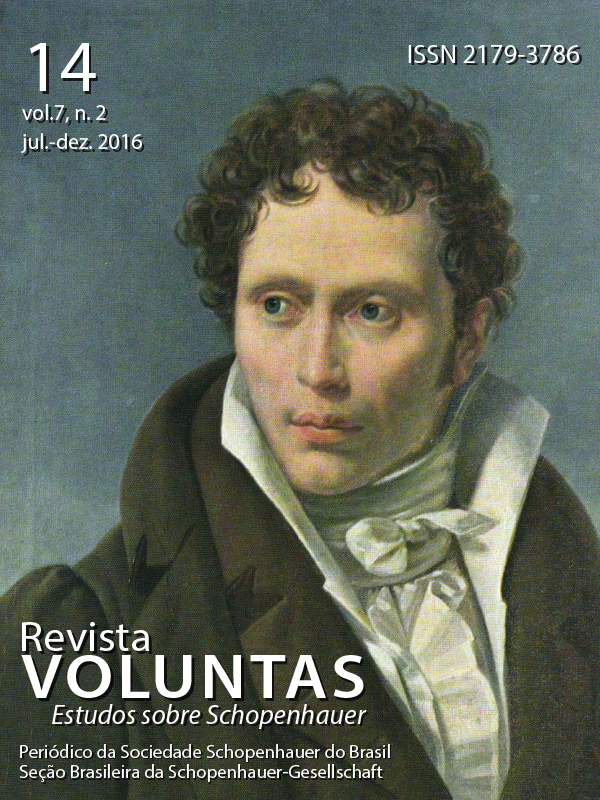The encounter of Schopenhauer with Indian thought: influence and legitimacy
DOI:
https://doi.org/10.5902/2179378633700Keywords:
Schopenhauer, Indian Thought, Influence, LegitimacyAbstract
This article aims to present differents positions regarding the encounter of Schopenhauer with Indian thought. The issue of the influence and legitimacy of this encounter has been a matter of debate between indologists and Schopenhauer interpreters for over a century, which is far from being resolved by a single answer.Downloads
References
SCHOPENHAUER, Arthur. Sämtliche Werke. Hrsg. von Arthur Hübscher. 7 Bde. Wiesbaden: F. A. Brockhaus, 1972.
SCHOPENHAUER, Arthur. Der Handschriftliche Nachlaß. Hrsg. von Arthur Hübscher. 5 Bde. Frankfurt am Main: Verlag Waldemar Kramer, 1966-1975.
SCHOPENHAUER, Arthur. Gesammelte Briefe. Hrsg. von Arthur Hübscher. Bonn: Bouvier, 1987.
SCHOPENHAUER, Arthur. De la quadruple Racine du príncipe de raison suffisante. Librairie Phiposophique J. Vrin, Paris, 1991.
SCHOPENHAUER, Arthur. O mundo como vontade e como representação. Tomo I. Trad. Jair Barboza. São Paulo: Unesp, 2005.
SCHOPENHAUER, Arthur. Seis ensaios de Parerga e Paralipomena, pequenos escritos filosóficos. Trad. Rosana Jardim Candeloro. Porto Alegre: Editora Zouk, 2016.
ANQUETIL-DUPERRON (trad.). Oupnek’hat. 1801 (primeiro tomo) e 1802 (segundo tomo).
APP, Urs. Notes and Excerpts by Schopenhauer Related to Volumes 1-9 of the Asiatick Researches. Schopenhauer-Jahrbuch, Bd. 79, 1998, pp. 11-33.
APP, Urs. Schopenhauer’s India Notes of 1811. Schopenhauer-Jahrbuch, Bd. 87, 2006 pp. 15-31.
APP, Urs. Schopenhauer’s Initial Encounter with Indian Thought. Schopenhauer-Jahrbuch, Bd. 87, 2006, pp. 35-76.
BERGER, Douglas. A question of influence: Schopenhauer, Early Indian Thought and a Critique of Some Proposed Conditions of Influence. In: Schopenhauer and Indian Philosophy: a dialogue between India and Germany. Edited by Arati Barua. New Delhi: Northern Book Centre, 2008, pp. 80-117.
APP, Urs. "The Veil of Maya": Schopenhauer's System and Early Indian Thought. Binghamton: Global Academic Publishing, 2004.
CLARKE, J. J. Oriental Enlightenment: The Encounter Between Asian and Western Thought. London-New York: Routledge, 1997.
CROSS, Stephen. Schopenhauer’s Encounter with Indian Thought, Representation and Will and their Indian Parallels. Honolulu: University of Hawai’i Press, 2013.
DEUSSEN, Paul. Allegemeine Einleitung und Philosophie des Veda bis auf die Upanishad’s. Leipzig: F. A. Brockhaus, 1922.
DEUSSEN, Paul. Wie ich zu Schopenhauer kam. Schopenhauer-Jahrbuch, Bd. 1, 1912, pp. 13-18.
GESTERING, Johann Joachim. German pessimism and Indian philosophy: a hermeneutic reading. Delhi: Ajanta Publications: Distributors, Ajanta Books International, 1986.
GLASENAPP, Helmuth von. The Influence of Indian Thought on German Philosophy and Literature’, Calcutta Review 29, 1928, 203.
GOUGH, Archibald Edward. The Philosophy of the Upanishads and Ancient Indian Metaphysics. 3ª ed. London: Kegan Paul, Trench, Trübner & CO. Ltda., 1903.
HALBFASS, Wilhelm. India and Europe. Motilal Banarsidass Publishers PVT. LTD. Delhi, 1990.
HALBFASS, Wilhelm. Philology and Confrontation: Paul Hacker on traditional and Modern Vedanta. Albany, NY: State University of New York Press, 1995.
HECKER, Max F. Schopenhauer und die indische Philosophie. Ko ln, 1897.
JANAWAY, Christopher. Schopenhauer – Past Masters (1996).
JANAWAY, Christopher (Ed.). The Cambridge Companion to Schopenhauer. Oxford: Cambridge University, 1999.
KEITH, Arthur Berriedale. The Religion and Philosopy of the Veda and Upanishads. Delhi: Motilal Barsidass, 1976.
MOCKRAUER, Franz. Schopenhauer und Indien. Einleitende worte zu den ero rterungen u ber das thema Europa und Indien. Schopenhauer-Jahrbuch, Bd. 15, 1928, pp. 3-26.
NICHOLLS, Moira. The Influences of Eastern Thought on Schopenhauer’s Doctrine of the Thingin-Itself. In: The Cambridge Companion to Schopenhauer. Christopher Janaway (Ed.). Cambridge University Press, 1999, pp. 171-212.
SEDLER, Jean. India in the mind of Germany: Schelling, Schopenhauer and their times. Washington D.C: University Press of America, 1982
Downloads
Published
How to Cite
Issue
Section
License
The submission of original manuscripts to this journal implies the transference, by the authors, of the copyrights for printed and digital publication. The copyrights of a published manuscript belong ultimately to the author, and only the copyright for its first publication is reserved to the journal. Authors may only use the same results in other publications explicitly indicating this journal as the medium of the original publication.
Licence
Attribution-NonCommercial-ShareAlike 4.0 International (CC BY-NC-SA 4.0) - This license lets others remix, tweak, and build upon your work non-commercially, as long as they credit you and license their new creations under the identical terms.






